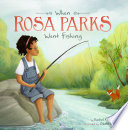Reviewed by Brianne Pitts
Review Source: Independent
Book Author: Rachel Ruiz
A picture book rendition of young Rosa Parks’ early life hopes to explore the joy, challenges, and agency of her childhood in rural Alabama. Though promising, like many well-meaning educators teaching the story of Rosa Parks, this text leaves readers with a sterile story that reinforces stereotypes, de-contextualizes history, and necessitates critical review by readers everywhere.
When Rosa Parks Went Fishing opens with a young Rosa on her way home from school. When she is pushed off the sidewalk by a white boy, Rosa pushes back, and so, the text teaches us, begins her work to counter unfair treatment of people based on skin color. Though this story only nominally mentions Rosa’s eventual rise to fame, the author draws parallels from this moment to her future activism. “And then one day in 1955, she did something simple and brave. She sat down in a bus seat — and became a hero to millions of people.” This retelling reduces Rosa’s childhood and adolescence to just that. Simple. It presents a docile, compliant, and “safe” story that does little to educate readers about young Mrs. Parks.
Not at all about fishing, the text provides a “mis-history” that centers the power and experience of Rosa’s early life in a series of single-page introductions to her family and upbringing. First, Rosa lives in poverty on a farm in Pine Level. There she receives advice from her grandparents to “stand up for what you believe in.” Later, she sees segregation in Montgomery, where she attends school beginning at age 11. The text highlights the close relationship Rosa built with the headmistress of her school, a “caucasian” teacher named Mrs. White, who taught her to “believe anything in life is possible” and to treat everyone “fairly and equally.” Following Mrs. White’s impact and Rosa’s grandmother’s death, Rosa’s story (about fishing?) ends with her meeting Raymond Parks, joining the NAACP, and finishing high school. The end comes suddenly and leaves the reader with many questions.
Unfortunately, this text is but one of a series of young childhood renditions by Capstone press. This series, and this text in particular, falls into misleading representations of famous figures, positioning dynamic activists such as Rosa Parks as heroes and saviors without critical discussion of the hardships and systemic oppression that brought her activism to bear.
The story is followed by an afterword, glossary, and suggested books to “read more.” These end pages continue to expose the inadequacies of this retelling. When, most egregiously, “Questions for Critical Thinking” add to the misappropriation of Rosa Parks’ story, they invite readers to list childhood traits and abilities and to name adults who shaped Rosa’s life. Since the book does little to recognize the impact of her mother and grandparents, students may focus on the white savior teacher, exacerbating this problematic retelling.
If reading When Rosa Parks Went Fishing, this reviewer recommends pairing it with opportunities for further reading (and teaching) about Mrs. Rosa Parks, her radical activism, and her story’s misuses. You may further want to invite critical literacy techniques into any discussion of this book — questions like: Who is telling this story? What is the author’s purpose? What is missing? What other ideas and experiences must be explored?
Resources for further reading:
Rosa — A beautifully illustrated book for children about Rosa Parks in the context of the Montgomery Bus Boycott.
The Politics of Children’s Literature: What’s Wrong with the Rosa Parks Myth — A critical analysis that challenges the myths in children’s books about Rosa Parks and the Montgomery Bus Boycott.
The Rebellious Life of Mrs. Rosa Parks — A revealing book that provides a window into Rosa Parks’ politics and years of activism.
Teaching the Montgomery Bus Boycott — Resources for learning and teaching about the Montgomery Bus Boycott that help put Rosa Parks and the boycott in the context of a greater struggle for social justice.
Brianne Pitts is a mother, teacher, and Black history researcher who lives in Wisconsin and delights in reading books.


When Rosa Parks Went Fishing by Rachel Ruiz
Published by Capstone on August 1, 2017
Genres: African American, Civil Rights Movement
Pages: 31
Reading Level: Grades 1-2, Grades 3-5
ISBN: 9781515815747
Review Source: Independent
Publisher's Synopsis: No discussion of the Civil Rights Movement is complete without the story of Rosa Parks. But what was this activist like as a child? Following young Rosa from a fishing creek to a one-room schoolhouse, from her wearing homemade clothes to wondering what "white" water tastes like, readers will be inspired by the experiences that shaped one of the most famous African-Americans in history.

Leave a Reply